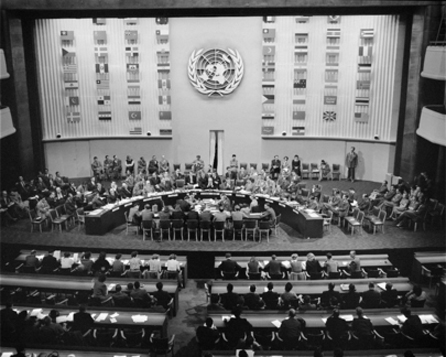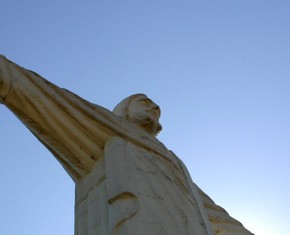The views expressed in our content reflect individual perspectives and do not represent the authoritative views of the Baha'i Faith.
Baha’u’llah, the prophet and founder of the Baha’i Faith, called for world unity, collective security and the peaceful settlement of disputes between nations. Those teachings launched the central social goal of the Baha’i Faith — the establishment of a functioning, unified system of world government.
In the roughly 150 years since Baha’u’llah first urged the world to unite, humanity has witnessed an enormous, rapid and unprecedented growth of international efforts to build a global governmental system. Starting with the Institute of International Law, formed in 1873 by the Belgian Jurist Gustave Rolin-Jaequemyns; and followed by the first embryonic world parliament, called the Inter-Parliamentary Union, organized by French and British parliamentarians in 1886; the world’s countries agreed in the Treaty of Versailles in 1920 to form the initial attempt at global government, the League of Nations.
That relatively short-lived body, with just 58 of the world’s nations participating, failed after the United States withdrew and the Nazis accelerated their drive for world domination in the late 1930’s. After World War II the Allies formed the United Nations, which currently includes 193 of the planet’s 196 nations as member states. Today, the UN remains a voluntary membership organization without much real power to adjudicate or solve international disputes — despite the urgings of prominent world leaders such as Gandhi, Einstein, Churchill and many others who advocated steps towards forming an effectual, federated and coherent system of world government.
The Baha’i teachings envision a much more direct, active and democratic approach to building the next iteration of global governance. Immediately after the formation of the League of Nations, Abdu’l-Baha outlined the judicial arm of a world federation:
For example, the question of universal peace, about which Baha’u’llah says that the Supreme Tribunal must be established: although the League of Nations has been brought into existence, yet it is incapable of establishing universal peace. But the Supreme Tribunal which Baha’u’llah has described will fulfill this sacred task with the utmost might and power. And His plan is this: that the national assemblies of each country and nation — that is to say parliaments — should elect two or three persons who are the choicest men of that nation, and are well informed concerning international laws and the relations between governments and aware of the essential needs of the world of humanity in this day. The number of these representatives should be in proportion to the number of inhabitants of that country. The election of these souls who are chosen by the national assembly, that is, the parliament, must be confirmed by the upper house, the congress and the cabinet and also by the president or monarch so these persons may be the elected ones of all the nation and the government. From among these people the members of the Supreme Tribunal will be elected, and all mankind will thus have a share therein, for every one of these delegates is fully representative of his nation. When the Supreme Tribunal gives a ruling on any international question, either unanimously or by majority rule, there will no longer be any pretext for the plaintiff or ground of objection for the defendant. In case any of the governments or nations, in the execution of the irrefutable decision of the Supreme Tribunal, be negligent or dilatory, the rest of the nations will rise up against it, because all the governments and nations of the world are the supporters of this Supreme Tribunal. Consider what a firm foundation this is! – Selections from the Writings of Abdu’l-Baha, pp. 306-307.
This unique model would not only legally prohibit deadly militarized conflict between nations; it would put into place the world’s first serious and straightforward mechanism for dealing with rogue nations who insist their “sovereignty” allows them to invade, colonize and make war on other nations.
Baha’u’llah envisioned that a great convocation of world leaders would initially elect a world parliament; and Baha’is believe that bringing it about has now become humanity’s most pressing requirement:
The time must come when the imperative necessity for the holding of a vast, an all-embracing assemblage of men will be universally realized. The rulers and kings of the earth must needs attend it, and, participating in its deliberations, must consider such ways and means as will lay the foundations of the world’s Great Peace amongst men. Such a peace demandeth that the Great Powers should resolve, for the sake of the tranquility of the peoples of the earth, to be fully reconciled among themselves. Should any king take up arms against another, all should unitedly arise and prevent him. If this be done, the nations of the world will no longer require any armaments, except for the purpose of preserving the security of their realms and of maintaining internal order within their territories. This will ensure the peace and composure of every people, government and nation. – Gleanings from the Writings of Baha’u’llah, p. 249.
Notice here that Baha’u’llah does not include ecclesiastics and leaders of religion in this description, instead specifically calling on the kings and rulers of the world’s nations, and especially its great powers, to come together to form the foundation of a united global governmental body.
You May Also Like
Comments


















(Proclamation of Baha'u'llah, p. 84)